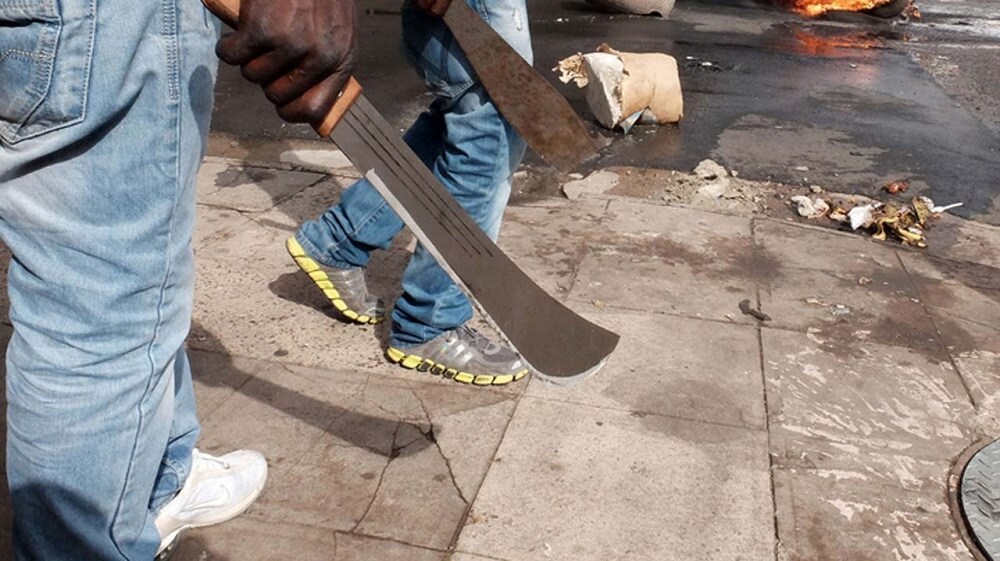🌿 Ruzu Non-Alcoholic Herbal Bitters
Ruzu Non-Alcoholic Herbal Bitters is a natural health supplement specially formulated to:
- ✅ Promote general wellness
- ✅ Detoxify the body
- ✅ Support the treatment of various ailments
Made from a powerful blend of 100% organic and medicinal herbs, Ruzu is completely alcohol-free, making it ideal for:
- 👪 All age groups
- 🌱 Health-conscious individuals
- 🌿 Anyone seeking non-alcoholic herbal remedies
Whether you're looking to boost your vitality, cleanse your system, or support healing the natural way, Ruzu Bitters offers a trusted herbal solution.
A recent research by SBM Intelligence claims that between January 2020 and March 2025, at least 909 gang violent episodes occurred in Nigeria, killing at least 1,686 persons.
According to reports, the study, which was made public on Tuesday, depicted a bleak image of gang and cult-related conflicts that were raging across many states, with the greatest number of fatalities occurring in Rivers, Lagos, and Edo.
With 215 recorded deaths, Rivers State led the list, followed by Lagos with 197 and Edo with 192, according to the SBM Intelligence report. These numbers highlight the rising violence associated with cult battles in urban and semi-urban areas.
According to the research, cult groups including the Vikings, Icelanders, Eiye, Aiye, Black Axe, and Greenlanders were among the main participants in these conflicts.
The report said that fierce feuds between Vikings, Icelanders, and Greenlanders, especially in Rivers State, are to blame for the South-South’s high death toll of over 750.
Worst Hit, South-South, Southwest
More than 750 people died in the South-South region, and 491 people died in the Southwest, particularly in Lagos and Ogun, where the Aiye and Eiye fraternities have frequently clashed.
More than 215 people were killed in the Southeast, mostly in Anambra, where separatist-related turmoil is thought to have combined with violent cult activity.
According to the report, “the Southeast is also extremely lethal (215+ deaths), with notable Viking and Aiye activity in Anambra.”
204 individuals were killed in cult-related violence in Benue State alone, with ongoing community disputes involving lesser-known organizations like Scavengers and Chain.
The research identified other flashpoints, such as a fatal conflict between Black Axe and Eiye cults in Edo in December 2023 that claimed over 30 lives in a single week.
Edo, Ogun, and Delta States accounted for 490 incidences (or 54% of all cult violence in the country) and 899 fatalities (or more than half of all deaths) between 2020 and the beginning of 2025.
Borno, Zamfara, and Kebbi Report Almost No Cult Deaths
Less than 30 people were killed in the Northeast and Northwest combined, according to the report, primarily as a result of armed banditry and terrorism overshadowing conventional cult activity.
“Terrorist groups dominate their security challenges, which is the main reason why states like Borno, Kebbi, Sokoto, Yobe, and Zamfara reported zero or minimal fatalities,” the report added.
There were also notable increases in cult-related killings in other states, like as Akwa Ibom (89 fatalities), Bayelsa (69), Osun (55), and Kwara (58), which may indicate that gang networks have expanded outside of their customary borders.
Gang Violence’s Deadliest Year in 2021
With 377 fatalities from 173 occurrences, 2021 was the worst year throughout the review period, according to SBM’s Violence Tracker. Political turmoil and post-COVID suffering were cited by analysts as the reasons for the surge.
Although there were fewer average fatalities per collision, the number of events peaked in 2024 with 273 incidences.
Read Also: Peter Obi’s Single-Term Proposal Not Convincing to Northerners – IPAC Boss Sani Explains
“The democratization of reporting through social media platforms like TikTok and 𝕏 (formerly Twitter) may be the reason for this surge, as incident accounts have surpassed traditional police releases,” the research continued.
However, 2022 saw a decline with 228 fatalities from 97 occurrences, most likely as a result of security crackdowns and short-term truces.
The report suggested that more young people are joining cult groups as a survival strategy and connected the increase in violence to Nigeria’s deteriorating economy.
SBM cautioned that incident counts for the first quarter of 2025 are already on course to exceed the total for 2022, but it also noted that the trend might be slowed by recent, more intense security measures.
The general trend indicates ongoing instability associated with cult rivalry, economic hardship, and lax law enforcement in urban slums, notwithstanding significant year-over-year variations.
















